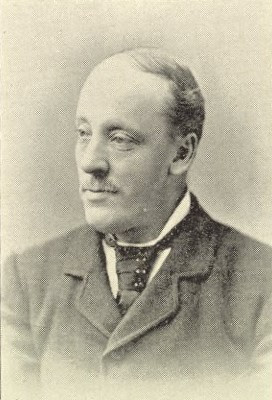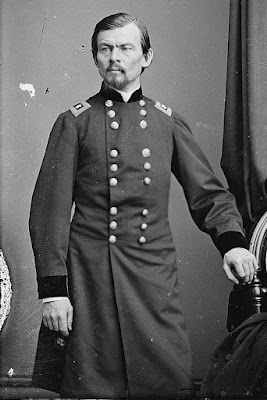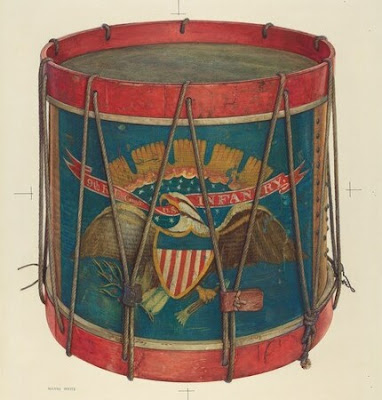Bloody Homecoming: Winchester and New Market with the 123rd Ohio
For Sergeant Frederick Wickham and his comrades of the 123rd Ohio, marching through the streets of Winchester, Virginia in May 1864 had the sense of both a homecoming and a funeral. “This was my first visit to the place since my capture last June and to march through the streets of the old town seemed like old times and I assure you afforded me a great deal of satisfaction. The bands of the different regiments struck up “Yankee Doodle” and the men, keeping step with the music, marched along with light step and proud satisfaction. As we passed through the place, the citizens were gathered in front of their houses watching us as we passed along and many an angry scowl were gathered on their faces, denoting their hatred for us and our noble cause,” he wrote.
“Passing through town we marched out on the Strasburg pike a
mile or two from town and encamped on the identical ground where we fought last
June, and where so many of our brave and noble boys offered up their lives to
their country. It seemed strange, indeed, that we were once more there, and
after pitching our tents, we strolled through the field to find marks of our previous
strife, and also to find the graves of our boys who were killed and buried on
the field. In making a search, the graves, or rather the scoop holes, of our
dead were found. In most of the cases where positive proof was had of the fact,
the remains of our boys who were killed and buried by the enemy on the field
were raised, put in a box, and decently buried again.”
Wickham’s account of the march through the Shenandoah Valley and subsequent Battle of New Market was published in the May 31, 1864 edition of the Norwalk Reflector.
Camp near Strasburg, Virginia
May 19, 1864
Our
whole force under the command of General Sigel left Martinsburg on the 29th
of April early in the morning and marched to Bunker Hill, a small town halfway
between Martinsburg and Winchester where we encamped. Here the force was
organized and the regiments assigned to brigades, our regiment being assigned
to the First Brigade, First Division. The division is commanded by General
Jeremiah C. Sullivan and the brigade is under the command of Colonel Augustus
Moor of the 28th Ohio. The forces comprising the brigade are the 18th
Connecticut, 28th, 116th, and 123rd Ohio
regiments.
We remained at Bunker Hill until
the morning of May 1st when we left for Winchester, arriving there
in the afternoon of the same day. This was my first visit to the place since my
capture last June and to march through the streets of the old town seemed like old times and I assure you
afforded me a great deal of satisfaction. The bands of the different regiments
struck up “Yankee Doodle” and the men, keeping step with the music, marched
along with light step and proud satisfaction. As we passed through the place,
the citizens were gathered in front of their houses watching us as we passed
along and many an angry scowl were gathered on their faces, denoting their
hatred for us and our noble cause. But there were a good many that seemed
delighted at our coming and waved their handkerchiefs to denote their joy. Such
manifestations as the latter brought forth many a cheer from the boys, while
the former were treated with silent contempt and a feeling such as we cherish
towards our enemies in the field.
 |
| Commissary Sergeant Frederick C. Wickham 123rd O.V.I. |
Passing through town we marched
out on the Strasburg pike a mile or two from town and encamped on the identical
ground where we fought last June, and where so many of our brave and noble boys
offered up their lives to their country. It seemed strange, indeed, that we
were once more there, and after pitching our tents, we strolled through the
field to find marks of our previous strife, and also to find the graves of our
boys who were killed and buried on the field. In making a search, the graves,
or rather the scoop holes, of our dead were found. In most of the cases where
positive proof was had of the fact, the remains of our boys who were killed and
buried by the enemy on the field were raised, put in a box, and decently buried
again. Just before the burial, the chaplain of the 18th Connecticut
was called to the grave and made some appropriate remarks and offered up an affecting
prayer. The grave of one other of Co. B by the name of Conger was found, but he
was buried a sufficient depth below the surface that his remains were not
disturbed. The graves of quite a number of our regiment were found on the
battlefield and I assure you the sight of them caused sad feelings among us.
There was a felling, however, which gave us comfort: it was that they had stood
as a barrier against the enemy, willing to be beaten down if necessary for
their country’s good. We all knew now how nobly they had stood up in the face
of the foe and how nobly they fell, and therefore we mourned the loss of our
comrades who were so good, so brave, and so true. Their remains lie mingling
with the dust, but the recollection of them together with their heroic deeds
will live in our hearts until we are gathered with them.
Some of our boys were wounded
and died in the hospital and were buried in the cemetery. Among those I found
while visiting the place was the grave of the much loved and brave Frith, and
also that of Richard Evans. Rough headboards were placed at the head of their
graves with their names together with the date of their death written on them
with lead pencil. As I looked on the
graves of those who, but a few months ago were along with us, engaged in the
great work of restoring this union; who were amongst us enjoying good health,
and whose hopes and anticipation were as bright as ours are now, I could hardly
bring myself to the thought that they were taken away from us forever. But
still, while I looked on the heaped up mounds of earth, I thought that no
sacrifices were too great for such a government and such a country as ours.
We stayed in Winchester a week
and then moved further up the valley as far as Woodstock. Here we remained
until early Saturday morning when orders were received to march in the
direction of Mount Jackson, up the valley. The orders were received very early in
the morning and at 4 o’clock the regiment was on its way to Mount Jackson. We
passed through Woodstock a distance of about a mile from where we camped and
also through Edinburg, a town six miles from the former place, and continued
along the pike until we reached Mount Jackson. At this place we stopped for a
rest, having marched very fast from our camping ground since early in the
morning and were quite tired.
 |
| Major General Franz Sigel |
Having gotten pretty well
rested, we started again and having marched a mile or so out of town,
cannonading was heard in the direction of New Market, a distance of five or six
miles. We heard soon after that the enemy was firing on our cavalry that had
advanced to within a mile or so of the latter place. The cannonading was kept
up all the time during our advance, and when we had arrived to within two or
two and half miles of town, our batteries (which had gone forward and chosen
their position) commenced to reply to the enemy’s gun with spirit. The battery
of the enemy was posted on a high hill about a mile and a half from our guns on
the right. Our batteries were posted advantageously on their right and in their
front and threw their shells right among the enemy with seeming good effect.
The artillery firing was kept up while the infantry was being placed into
position. During this time, night was coming on and the firing soon ceased.
Our regiment with the 1st
West Virginia was posted on the right in support of a battery. Skirmishers were
thrown out in advance and in a short time the enemy’s pickets or skirmishers
were engaged, and a heavy fire was poured upon them by our men which forced
them to retire. In the fire one of our men was wounded in the arm; his name is
Carson from Co. C. After this fire nothing more was heard of the enemy during
the night, and our men held their position. During our march from Woodstock and
up to this time a shower of rain was falling upon us and the men were drenched,
which of course, produced very disagreeable feelings, but the men endured it
without a murmur. We supposed, from the obstinate stand the enemy made during
the day, that they had quite a force and that they would open upon us early in
the morning.
Morning came and time passed by
without bringing any tidings of the enemy, but it was supposed they were only holding
back in order to draw us on; accordingly a squad of cavalry was deployed into
line and advanced cautiously across the field and through a piece of woods in
our front for the purpose of feeling the enemy. They were advanced to where the
enemy was posted the evening previous but nothing could be found. It was
supposed then that they had retreated and a force of cavalry was sent ahead to
discover if such was the case. They passed beyond the town a few miles but
could not discover anything until coming back when they were fired upon by the
enemy, who were posted on their right and occupying a very formidable position.
Our artillery was immediately place in position and opened on them with vigor.
This was about 8 or 9 o’clock in the morning and soon the cannonading was
pretty hot from both sides.
 |
| Musician James B. Willoughby Co. F, 123rd O.V.I. |
We had heard previous to this
that the Rebels had been largely reinforced during the night and therefore we
felt as if the day would bring on a heavy engagement. They had thrown up
breastworks on a high hill and were strongly posted. After about an hour or two
of cannonading by two of our batteries and those of the enemy, the rest of our
guns commenced coming up and as soon as they arrived, they would be properly
posted and then open upon them. We had more artillery than they and when all of
our guns commenced firing there was pretty lively work. The infantry soon
opened fire upon them pouring deadly missiles into their ranks, killing and
wounding a large number of them. During this time the enemy was advancing in three
lines of battle and as their force was much larger than ours, we were compelled
to fall back.
The fire of the enemy was very
severe on our troops, but they stood up like brave and true men, returning
their fire with vigor and effect. Officers and men stood their ground without
flinching and their determined bravery and valor is attested in the number of
the dead and wounded. The 123rd Ohio went into the fight with about
550 and their loss was some 89 killed, wounded, and missing. Companies D, A,
and H were the severest sufferers, the former having lost 26 men and the other
two losing about twelve to fifteen men each. Co. B was on the skirmish line and
was very fortunate, losing only one man and he was taken prisoner. Although we
were forced to fall back with a loss to our whole force of some 500-600, still
the men were in no ways disheartened, but as ready and willing, as soon as they
are called, to again meet the enemy in the conflict of battle, feeling
confident that the time will soon come when they will prove victorious and be
able to bear aloft the old flag where it has not waved for a long time and
where treason now rankles.
General Sigel has issued an
order congratulating the men for their bravery. The friends of the 123rd
Ohio need never fear but what they will do their duty and never flinch from
danger, and they may also feel proud of what they have already done. Our
present commander Major Kellogg knows how to perform his duty and knowing it,
always does it. He is a good and true man and a brave soldier. In time of
battle, he leads his regiment as coolly as if he were on dress parade, and
neither cannon nor musket ball can turn him from where his duty lies. His men
love him and will follow where he leads. Major Kellogg had a very narrow
escape. A ball struck his belt, passed through it, and also through his pants,
grazed the flesh and dropped down into the seam of his pants where he
afterwards found it. It was a very narrow escape for him. The Rebs evidently
meant to fetch him, for his horse was shot three times; once in the neck, once
in the head, and once a piece of shell struck him, tearing up the skin a
little. We all feel rejoiced that the Major escaped as well as he did and hope
he may never receive a more dangerous wound.
The wounds of most of the men were quite slight ones. All that were wounded have been sent to Martinsburg to the hospitals of that place. Some of the wounds were very frightful and ghastly. One man from Co. D in our regiment was shot so badly in the arm just above the elbow that it had to be amputated. I saw the poor fellow just after the arm was taken off and I can tell you it looked hard enough. They had administered chloroform to him by the was somewhat conscious about the time they were sewing the flap of the arm and it must have been very painful, for he begged of the surgeons to give him some more chloroform in order that he might sleep off the pain. I pitied the poor man and felt thankful indeed that my arm was not amputated and that I had received no wound.
Letter
from Commissary Sergeant Frederick C. Wickham, 123rd Ohio Volunteer
Infantry, Norwalk
Reflector (Ohio), May 31, 1864, pg. 2












Comments
Post a Comment